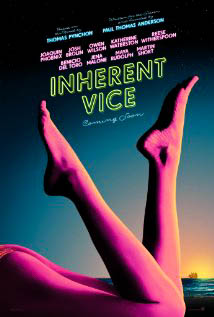
Paul Thomas Anderson deals in extremes. He wields the camera in his films to erect giant scenes, sweeping incidents of biblical scope, terrifying, monolithic, unshakeable moments, and pure undiluted awe. He also features shots that explore human faces down to their tiniest details, and moves bodies gracefully and effortlessly through space. Even in their funniest moments, his films have an innate seriousness about them, a tangible confidence and care in every shot, every line, and every facial expression. Regardless of one’s opinion on his work, it’s hard to deny Anderson as a serious force in art cinema.
It’s easy to understand why, after two decades of this, Paul Thomas Anderson wanted to direct a stoner comedy.
“Inherent Vice,” based on the novel of the same name by the famously reclusive and incomprehensible Thomas Pynchon, is Anderson’s seventh film. It comes on the heels of his two most intense films, the American-dream-as-monster-myth thrill of “There Will Be Blood,” and the deeply polarizing yet undeniably powerful “The Master.” It has very little in common with either of them. Where “Blood” and “Master” were unwaveringly focused on their most prominent characters, “Inherent Vice” spends its 150-minute runtime bumbling around a massive cast of characters, few of which remain for longer than a five- or ten-minute scene. The plot rambles, prattling with poetic, confusing exposition, filled to the brim with silly names, strange details, and impossible to follow twists and turns. It’s a pivot in the narrative style of the auteur director, one that works to the film’s advantage and disadvantage. While the combination of laconic narrative and overwhelming character is consistently watchable, the amount of exposition bogs down the proceedings, and some of the smaller scenes suffer under the crushing weight of Pynchon’s details.
Anderson deals with this cleverly, injecting the world with an omniscient, enigmatic narrator. Recruiting the interesting, warm vocal tones of singer/harpist Joanna Newsom, “Vice” manages to turn some of the clunkiest, hardest to translate material in Pynchon’s novel into something cinematic and something that serves the film. A mid-film monologue, as delivered by Newsom, begins with beautiful abstract prose and ends with the most hilarious dismissal since the opening of “The Big Lebowski.”
Regardless of the size of the role, “Inherent Vice’s” cast is excellent. Of course, the lion’s share of the praise is directed towards Joaquin Phoenix, who anchors the film as the perpetually stoned PI “Doc” Sportello. Phoenix—one of the best actors out there right now—worms his way through the film with grace; there isn’t a false note in his performance. He’s just as out of his depth as the audience, but he exploits the character. This is no Jacques Closeau or Maxwell Smart; Doc is an intuitive, intelligent person, who just happened to stumble upon a chaotic sea of confusion.
However, Phoenix is far from the only skilled performer here. Josh Brolin is incredible as Bigfoot Bjornsen, Doc’s aggressive and pathetic foil. Katherine Waterston’s Shasta Fay Hepworth, one of the film’s crucial characters, fills her few scenes with a tragedy, a melancholy, and a seductiveness worth watching out for. The other actors on display—Benicio del Toro, Owen Wilson, Maya Rudolph, Michael K. Williams, Jena Malone, a never-better Martin Short—make the most of their brief time.
The film’s score, the third Anderson soundscape penned by Radiohead guitarist Jonny Greenwood, is immaculate as well. Its warm, guitar-heavy, hazy sound perfectly complements the gorgeously rendered recreation of late-70s California. The opening sequence, featuring the music of the great German band Can, is striking and gorgeous, a wonderful blend of light and sound that transcend both mediums.
At this point, I genuinely don’t know what I think about this movie. It’s so dense, so difficult to describe and understand. It demands your attention and it demands multiple viewings. What I do know is this: there are moments in this film that have the power to linger, something that cannot be blown or brushed away. Above all else, “Inherent Vice” is a Paul Thomas Anderson film and stands as the work of a filmmaker with no rival or substitute, like it or not.


Leave a Reply